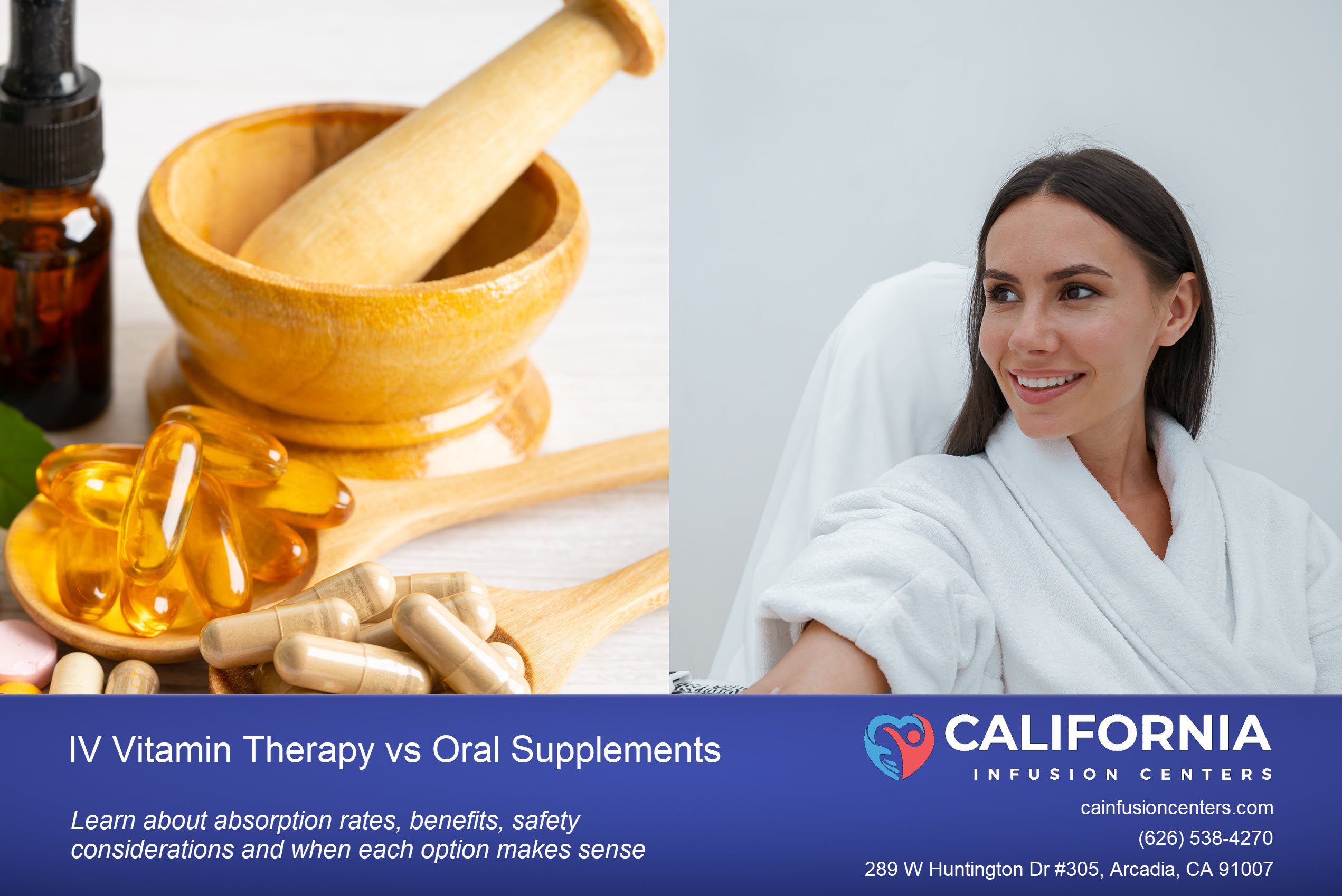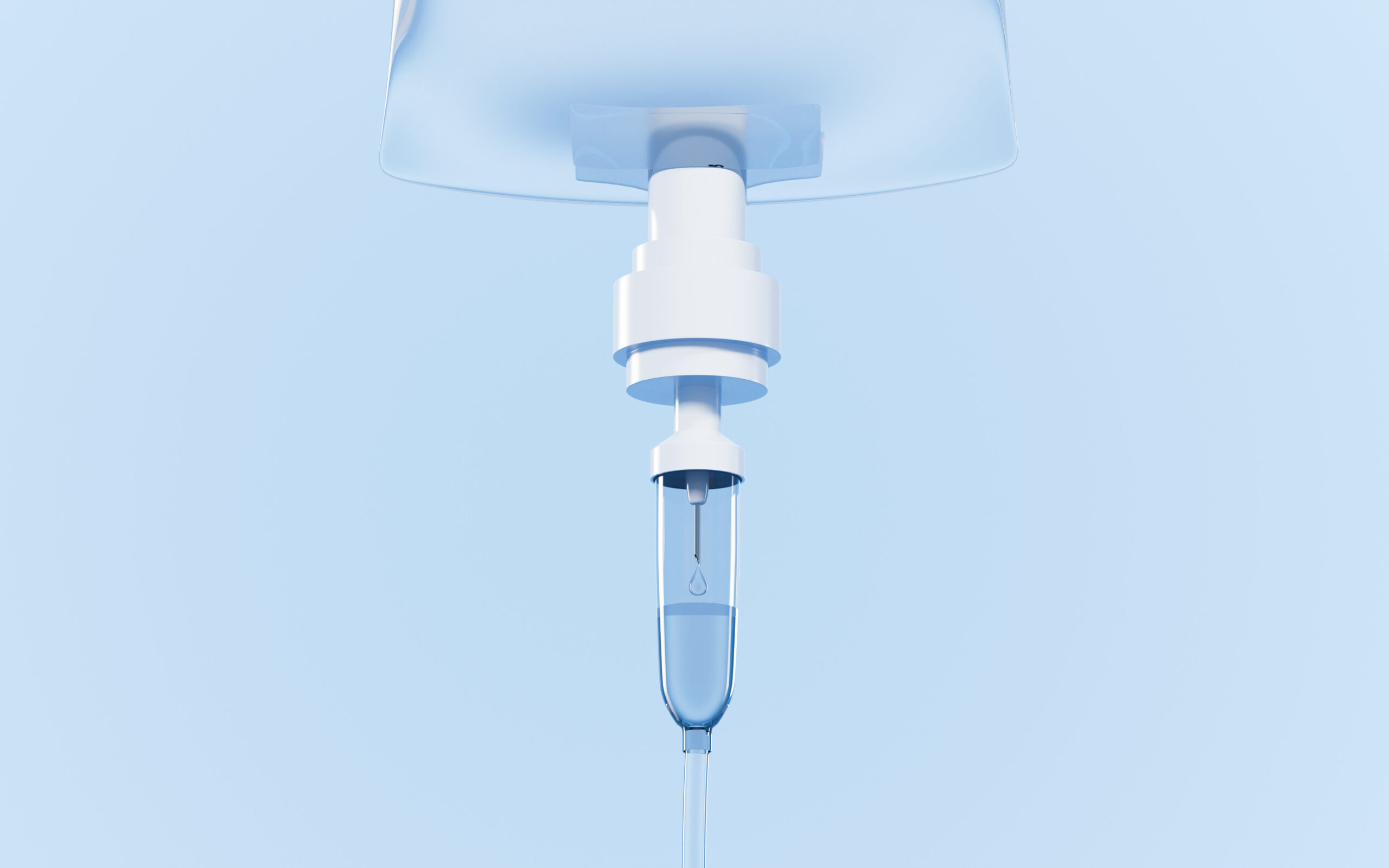Home » IV Vitamin Therapy » IV Vitamin Therapy vs Oral Supplements

Resource Contents
Most people are familiar with taking vitamins by mouth, whether as a daily multivitamin or targeted supplements like vitamin C or B12. These options are accessible and inexpensive, making them the first line for supporting nutrition. But when people want faster results or have trouble absorbing nutrients, IV vitamin therapy has become a popular alternative.
IV therapy involves placing a small catheter into a vein and delivering fluids with vitamins and minerals directly into circulation. This method avoids the digestive tract and first-pass metabolism, which means nutrients reach therapeutic blood levels more quickly. Hospitals have long used IV delivery for hydration and medications, and wellness clinics now apply the same principles to micronutrients and hydration formulas. You can read more about how it works in our What Is IV Vitamin Therapy guide.
Understanding the differences between oral and IV delivery helps patients make informed choices about which method best supports their goals. For many, the two approaches complement each other rather than compete.

The most important difference between IV therapy and supplements is absorption. When you take vitamins by mouth, they must pass through the stomach and intestines before entering the bloodstream. Along the way, digestive enzymes, stomach acid and individual variations in gut health affect how much is absorbed. According to the National Institutes of Health, absorption rates vary widely depending on the nutrient and the person’s baseline status.
By contrast, IV vitamin therapy bypasses the gut entirely. Nutrients infused directly into the bloodstream have nearly 100 percent bioavailability, which is why this route is used in medical settings for hydration and deficiencies. This does not mean IV therapy is necessary for everyone, but it explains why people with absorption challenges or immediate needs often see faster effects.
IV therapy offers several advantages in specific situations. For hydration, IV fluids restore circulating volume faster than oral intake, which is especially valuable when vomiting, illness or travel makes drinking difficult. Patients with documented deficiencies in B12 or magnesium can achieve therapeutic levels more quickly with IV delivery. Those dealing with malabsorption from conditions like celiac disease often benefit from bypassing the gut altogether.
Wellness clinics that offer IV vitamin therapy, like California Infusion Centers, also tailor IV blends for energy, recovery and immunity. Popular options include the Myers’ Cocktail, glutathione and high-dose vitamin C. As discussed in IV Vitamin Therapy Benefits, evidence for broad use in healthy adults is mixed, but there is stronger support when therapy is targeted to specific goals.
Another unique benefit is speed. Patients often report feeling better within hours after hydration or migraine infusions. Relief from fatigue, headaches or dehydration can appear more quickly compared with waiting for oral supplements to take effect over days or weeks.
Oral vitamins remain the most practical choice for everyday wellness. They are widely available, affordable and effective for maintaining adequate levels of many nutrients. Daily supplements such as vitamin D, calcium and omega-3 fatty acids have strong evidence for supporting bone, cardiovascular and general health when deficiencies exist.
The Mayo Clinic emphasizes that supplements are not a substitute for balanced nutrition but can help fill gaps. They are especially useful for people who may not need or want the intensity of IV therapy. Unlike infusions, oral vitamins are convenient and do not require a clinic visit.
However, oral supplements are limited by absorption variability and dose tolerance. Some patients experience stomach upset or cannot reach high enough serum levels for certain nutrients when relying solely on pills. That is where IV therapy provides a complementary option.

Both IV therapy and supplements are safe when used appropriately, but each carries unique risks. Oral vitamins may interact with medications or cause toxicity if taken in excess. Fat-soluble vitamins like A, D, E and K accumulate in the body, so daily monitoring is important.
IV therapy requires sterile technique and licensed medical oversight. Mild effects like bruising at the IV site are common, but serious complications such as infection or electrolyte imbalance are rare when protocols are followed. Choosing a reputable clinic is critical. See our article Is IV Vitamin Therapy Safe for details on safety protocols, side effects and who should avoid treatment.
Ultimately, safety depends on screening, professional supervision and transparent ingredient lists. Whether oral or IV, any supplementation should be tailored to your health history and current needs.
Supplements are widely available at pharmacies, supermarkets and online retailers. They typically cost pennies per dose, making them the most economical option for long-term maintenance.
IV therapy is more expensive because it requires clinical staff, sterile compounding and one-on-one care. In Los Angeles, Arcadia and Pasadena, typical wellness infusions range from $199 to over $1000 per session depending on the formula. Medically necessary treatments like iron infusions may be covered by insurance, while wellness blends are usually cash-pay. Our Insurance page explains how coverage works for different therapies.
Accessibility also differs. Supplements can be taken anywhere at any time, while IV therapy requires booking a visit. For a breakdown of what to expect during treatment, see What to Expect at Our Clinic.

IV therapy may be the better choice if you have a documented deficiency, malabsorption condition, acute dehydration, migraines or a tight timeline for recovery. Supplements are more appropriate for daily maintenance, gradual improvement and long-term wellness routines.
For many people, the best plan may be a combination. Supplements provide a baseline of support while IV therapy addresses specific needs or situations where faster or more reliable delivery is required. Our Vitamin Therapy services are designed to help patients personalize this balance.
It depends on your goals. IV therapy ensures direct delivery and rapid absorption, making it effective for deficiencies and hydration. Supplements are effective for long-term maintenance but slower to take effect.
Not necessarily. IV therapy addresses acute or targeted needs, while supplements may still be important for daily health. A consultation with a licensed provider helps determine the right mix.
Yes, it is possible to over-supplement certain nutrients. Professional oversight ensures you are not doubling up unnecessarily.
Hydration and energy effects are often felt the same day. Supplements may take weeks of consistent use to show measurable changes.
Supplements are less expensive for routine use. IV therapy costs more per session but may be worth it for acute needs or when oral supplements are ineffective.
If you want a better understanding of how IV vitamin therapy compares with supplements, the best next step is a consultation. At California Infusion Centers in Arcadia serving the Greater Los Angeles area, our licensed team tailors treatment to your needs while prioritizing safety and comfort. Learn more about our Services or Book an Appointment to get started.
Call: (626) 538-4270
Email: info@cainfusioncenters.com
California Infusion Centers, located in Arcadia, CA, offers IV Vitamin Therapy for patients throughout Arcadia, Pasadena, Los Angeles and surrounding areas.
Tagged in:
Disclaimer:
This page is educational and is not a substitute for medical advice, diagnosis or treatment. Always consult with a licensed clinician before beginning or changing any supplement or infusion plan.